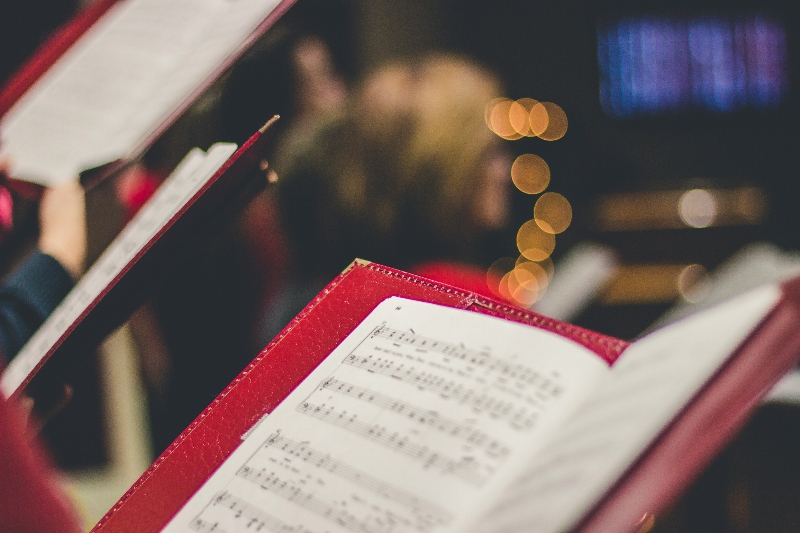Hark! How all the welkin rings
A reflection on our rich, muddled history of carol singing, by Andrew Gant

Non-conformist traditions have a particular place in the rich, muddled history of carol singing (as do many others).
Charles Wesley himself gave us the words of Hark! The Herald Angels sing.
Well, actually, he didn’t. He gave us precisely one word of that opening line before we move on to the additions and interpolations of others. What Wesley really wrote was
Hark! How all the welkin rings:
Glory to the King of Kings!
Changes crept in from the very beginning. Some were the work of Wesley’s own contemporaries and collaborators, including George Whitefield and Martin Madan. Later editors and compilers of hymn and carol books agreed.
Why?
I would suggest that Wesley’s initial couplet is a more inspiring evocation of the familiar scene from St John’s gospel than the slightly limp:
Hark! The Herald Angels sing,
Glory to the new-born king
Wesley’s lines borrow the phrase “King of Kings” from scripture. Whitefield’s don’t. Whitefield relegates the reference to what could in theory be any old king.
Even more, later in the first verse Wesley wrote:
Universal Nature say,
Christ the Lord is born today
Whitefield demurred at this rather pantheistic, strikingly enlightenment image, replacing it with:
With th’angelic hosts proclaim,
Christ is born in Bethlehem
It doesn’t scan, doesn’t rhyme, and puts a whacking great accent on the last syllable of the word “Bethelehem”.
The music, too, has nothing to do with Christmas. It’s a chorus from a cantata composed by Mendelssohn in honour of the anniversary of the great German reformation printer Johannes Gutenberg. Indeed, Mendelssohn specifically told his publisher that his tune would “never do to sacred words”.
But we don’t sing carols in the form we do because of any objective evaluation of quality, sense, appropriateness or historical authenticity. We sing them like that because we just do. That’s how an oral tradition works, passed down by word of mouth.
And, besides, Wesley’s editors thought their readers wouldn’t know what a “welkin” was (readers of this publication, of course, being intelligent and well-read people, know perfectly well).
In some of our carols, the doctrinal content can be a little hazy. It Came Upon the Midnight Clear is a beautiful song, but it doesn’t mention God much. Nor does it mention Jesus, or indeed any part of the familiar Christmas story, with the exception of the herald angels, which the poet, the 19th-century American Unitarian minister Edmund Hamilton Sears, uses as the springboard for a meditation on the troubled state of the world. The great hymnologist and chronicler of such things, Erik Routley, calls it 'little more than an ethical song, extolling the worth and splendour of peace among men'.
Why “little more”? What more could we want? Routley is right. This song is simply a plea for peace: not even a prayer, since the appeal is addressed not to the Deity, be it Trinity or Unity, but to the whole world, implored to hear the song the angels sing and give it back to heaven.
It is beautifully constructed, ending every verse with the same two words, approached from a different direction and with a different rhyme to end line six, setting up the final couplet skilfully and movingly.
It Came Upon the Midnight Clear is also another example of a notable subset in our English Christmas Carol tradition: it isn’t English.
At least, the words aren’t.
Nor is the tune.
At least, one of the tunes isn’t.
A couple of years ago I had the enormous privilege of attending the wonderful Festival of Nine Lessons and Carols in the soaring chapel of King’s College, Cambridge. We had a cousin from America staying with us at the time.
Halfway through the service we turned the page to find the instruction 'The congregation will stand to sing It Came Upon the Midnight Clear.' We shuffled obediently to our feet. The organ began the playover. After a bar or two my cousin turned to me and whispered 'What’s going on? They’re playing the wrong tune.'
She was right. They were. Sears had his poem set to music by an organist friend, Richard Storrs Willis. That tune, St Louis, is the one sung in the US today. In England, the words were paired with a different tune by the young Arthur Sullivan, then working as music editor of a new book of hymns and carols. Sullivan called is tune Noel, and said it was a “Traditional Air rearranged”. He didn’t, however, say where he found it, or what rearranging was involved. Did he, in fact, write it himself?
It’s just one of the many unknowable unknowns that go to make up the rich pudding that is our English carol tradition.
And the “welkin”?
It’s a fine old English word for the sky, the firmament, the heavens: the perfect evocation of the celestial performance that first Christmas night.
Happy Christmas.
Image | David Beale | Unsplash
Andrew Gant is a composer, conductor, and university lecturer. He has directed many leading choirs, including those of the Guards' Chapel, Selwyn College, Cambridge, and Her (now His) Majesty's Chapel Royal based at St James's Palace in London, where he led the choir at many state events.
Andrew has published several books on musical topics, including Deck the Hall: The Stories of our Favourite Christmas Carols
Do you have a view? Share your thoughts via our letters' page.
Baptist Times, 18/12/2024